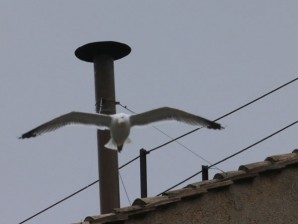All eyes on Vatican chimney as world awaits new pope

A seagull glides past the chimney on the roof of the Sistine Chapel, in St. Peter’s Square at the Vatican, Tuesday, March 12, 2013. The most gazed-at item at the Vatican this week will be a humble, copper, two-meter (six-foot) high chimney that will pipe-out puffs of smoke to tell the world if there’s a new pope. Black smoke means “not yet.” White smoke means “pope elected.” (AP Photo/Dmitry Lovetsky)
VATICAN CITY—Cardinals went Wednesday into a second day of conclave behind Vatican walls to elect a pope, with all eyes on a chimney that will signal when there is a new leader for the world’s 1.2 billion Catholics.
The 115 cardinals held a first inconclusive vote in the Sistine Chapel on Tuesday as they began the process of finding a successor to Benedict XVI, who brought a troubled eight-year papacy to an abrupt end by resigning last month aged 85.
Black smoke billowed into the night air above the Vatican, indicating that no one had gained the two-thirds majority needed to become the 266th Roman pope.
White smoke — produced by mixing the smoke from burning ballots with special flares — would indicate that a new head of the Roman Catholic Church has been chosen.
The atmosphere is laden with suspense as no clear frontrunner has emerged, although conjecture has coalesced around three favourites: Italy’s Angelo Scola, Brazil’s Odilo Scherer and Canada’s Marc Ouellet, all conservatives like Benedict.
Article continues after this advertisement“So far there is no majority, but some candidates with little support will fall out soon,” an anonymous cardinal who is too old to vote in this conclave but took part in preliminary meetings told the Italian daily La Stampa.
Article continues after this advertisementSome analysts suggest that Benedict’s dramatic act — the first papal resignation in over 700 years — could push the cardinals to take an equally unusual decision and that an outsider could emerge as a compromise candidate.
Hopes are high in the Philippines for the popular archbishop of Manila, Luis Antonio Tagle, and on the African continent for South Africa’s Wilfrid Napier, the archbishop of Durban, but in practice their chances are very slim.
Two-thirds of the cardinals are from Europe and North America, and the view among many experts is that only someone with experience of its inner workings can reform the scandal-tainted Vatican bureaucracy, the Roman Curia.
In interviews given before the conclave, cardinals pointed to new job requirements arising from the problems facing a Church that is struggling in many parts of the world with scandals, indifference and conflict.
“Managerial skills will surely be useful,” Vienna Archbishop Christoph Schoenborn told La Stampa.
And in an indication of a fault-line among voting cardinals between Vatican insiders and those running far-flung dioceses, Nigerian John Onaiyekan spoke of “new and innovative methods to boost collegiality.”
“In this regard there is a lot of room for development,” said Onaiyekan, the archbishop of the Nigerian capital Abuja.
All were appointed by Benedict or his predecessor and ideological soulmate John Paul II.
‘Mahony’s fingerprints’
What many cardinals want is a leader who can re-ignite Catholic faith — particularly among young people — in the way the charismatic John Paul II did.
There have been calls too from within the Church for a rethink of some basic tenets such as priestly celibacy, the uniform ban on artificial contraception and even allowing women to be priests as in other Christian denominations.
The scandal of sexual abuse of children by pedophile priests going back decades — and the cover-up of their actions by senior prelates — also cast a long shadow on the Church that the next pope will inherit.
And in a reminder of the relentless pace of the scandal, new details emerged implicating one of the cardinals, Los Angeles Archbishop Roger Mahoney, accused of protecting predator priests.
Lawyers said Tuesday that the archdiocese had agreed to pay nearly $10 million (750,000 euros) to four men who alleged they were molested by a former priest in the 1970s.
“Cardinal Mahony’s fingerprints were all over the case,” lawyer Vince Finaldi told the Los Angeles Times.
Mahony — whom victims’ groups had urged to stay away from the conclave — retired as Los Angeles archbishop and was stripped of church duties by his successor for mishandling claims against dozens of priests.
The cardinals on Tuesday filed into the chapel, chanting a Latin hymn to ask for divine guidance and swearing a solemn oath never to reveal the secrets of their deliberations on pain of excommunication.
The “Princes of the Church” are cut off from any contact with the outside world for the duration of the conclave. They eat and sleep in a Vatican residence where windows are locked shut and phones are for internal use only.
Modern-day conclaves normally last no more than a few days. Benedict’s election in 2005 following the death of John Paul II took just two days.
The tradition of holding conclaves — literally “with key” in Latin — dates back to 1268 when cardinals were locked into the papal palace in Viterbo near Rome by an angry crowd because they were taking too long to choose a pope.
Their conclave still dragged on for nearly three years, despite townspeople tearing off the roof of the palace and feeding them only bread and water.